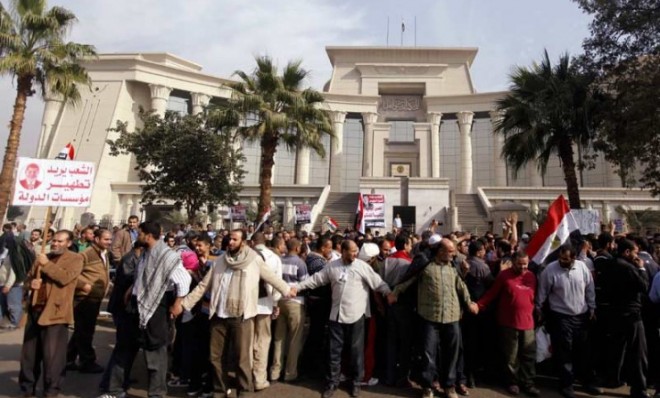Have Islamists derailed Egypt's fledgling democracy?
The country's courts shut down, intensifying their power struggle against President Mohamed Morsi and his Islamist allies


A free daily email with the biggest news stories of the day – and the best features from TheWeek.com
You are now subscribed
Your newsletter sign-up was successful
Egypt's top court shut down indefinitely this weekend as it faced protests by Islamists allied with President Mohamed Morsi. The judges were trying to convene to review the legality of parliament's Islamist-dominated upper house and constitutional assembly, which last week approved a draft of the country's new constitution. Morsi is vowing to hold a national referendum on the constitution on Dec. 15, but any such vote is supposed to be supervised by judges, so the power struggle between Morsi — who triggered mass protests with a recent decree putting his actions above court review — and the courts, which are dominated by judges put in place before Hosni Mubarak was ousted last year. Are Morsi and his Islamist allies destroying Egypt's opportunity to build a stable democracy?
The Islamists are hijacking Egypt's democracy: During last year's revolution, the Islamists joined forces with secular revolutionaries to topple Mubarak in the name of democracy, says Fareed Zakaria at CNN. Now that the Islamists are in control, the true revolutionaries are "finding themselves uneasy allies with these Mubarak loyalists." The fight over this constitution, "which they find to be very retrograde," could be decisive, as "it takes Egypt a significant step" toward Islamic rule.
"Islamists vs. the secularists in Egypt?"
The Week
Escape your echo chamber. Get the facts behind the news, plus analysis from multiple perspectives.

Sign up for The Week's Free Newsletters
From our morning news briefing to a weekly Good News Newsletter, get the best of The Week delivered directly to your inbox.
From our morning news briefing to a weekly Good News Newsletter, get the best of The Week delivered directly to your inbox.
Islamists should run a democratic Egypt: Yes, "Morsi comes from the Muslim Brotherhood," says Siddique Malik at the Louisville, Ky., Courier-Journal. He was also democratically elected, and he has demonstrated that he feels "the weight that a people equipped with newly won liberties" put on his shoulders. Otherwise he would have simply sided with Hamas, the Palestinian equivalent of the Brotherhood, in their recent fight with Israel, instead of brokering a ceasefire.
"Egyptian democracy key to regional peace"
Actually, neither side has this democracy thing down: It's hard to deny that the Islamist parties are trying to "impose their conservative religious and cultural views on the entire country," says Matthew Fisher at Canada.com. Still, voters put the Islamists in power, and opposition forces, although they claim to "cherish democracy," are acting as if they're the ones who triumphed in the elections. Until all Egyptians, win or lose, learn to accept election results, compromise will be impossible, and democracy just a dream.
"Egypt's Islamists and liberals claim to cherish democracy but not enough to practice it"
A free daily email with the biggest news stories of the day – and the best features from TheWeek.com
Harold Maass is a contributing editor at The Week. He has been writing for The Week since the 2001 debut of the U.S. print edition and served as editor of TheWeek.com when it launched in 2008. Harold started his career as a newspaper reporter in South Florida and Haiti. He has previously worked for a variety of news outlets, including The Miami Herald, ABC News and Fox News, and for several years wrote a daily roundup of financial news for The Week and Yahoo Finance.
-
 Political cartoons for February 14
Political cartoons for February 14Cartoons Saturday's political cartoons include a Valentine's grift, Hillary on the hook, and more
-
 Tourangelle-style pork with prunes recipe
Tourangelle-style pork with prunes recipeThe Week Recommends This traditional, rustic dish is a French classic
-
 The Epstein files: glimpses of a deeply disturbing world
The Epstein files: glimpses of a deeply disturbing worldIn the Spotlight Trove of released documents paint a picture of depravity and privilege in which men hold the cards, and women are powerless or peripheral
-
 The billionaires’ wealth tax: a catastrophe for California?
The billionaires’ wealth tax: a catastrophe for California?Talking Point Peter Thiel and Larry Page preparing to change state residency
-
 Bari Weiss’ ‘60 Minutes’ scandal is about more than one report
Bari Weiss’ ‘60 Minutes’ scandal is about more than one reportIN THE SPOTLIGHT By blocking an approved segment on a controversial prison holding US deportees in El Salvador, the editor-in-chief of CBS News has become the main story
-
 Has Zohran Mamdani shown the Democrats how to win again?
Has Zohran Mamdani shown the Democrats how to win again?Today’s Big Question New York City mayoral election touted as victory for left-wing populists but moderate centrist wins elsewhere present more complex path for Democratic Party
-
 Millions turn out for anti-Trump ‘No Kings’ rallies
Millions turn out for anti-Trump ‘No Kings’ ralliesSpeed Read An estimated 7 million people participated, 2 million more than at the first ‘No Kings’ protest in June
-
 Ghislaine Maxwell: angling for a Trump pardon
Ghislaine Maxwell: angling for a Trump pardonTalking Point Convicted sex trafficker's testimony could shed new light on president's links to Jeffrey Epstein
-
 The last words and final moments of 40 presidents
The last words and final moments of 40 presidentsThe Explainer Some are eloquent quotes worthy of the holders of the highest office in the nation, and others... aren't
-
 The JFK files: the truth at last?
The JFK files: the truth at last?In The Spotlight More than 64,000 previously classified documents relating the 1963 assassination of John F. Kennedy have been released by the Trump administration
-
 'Seriously, not literally': how should the world take Donald Trump?
'Seriously, not literally': how should the world take Donald Trump?Today's big question White House rhetoric and reality look likely to become increasingly blurred
